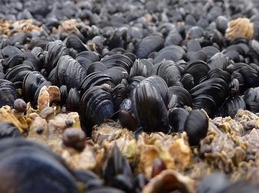 The poor mussel yield attributed to the dry summer has had an impact in Nelson but processors say it is just a part of the industry.
The poor mussel yield attributed to the dry summer has had an impact in Nelson but processors say it is just a part of the industry.The Wakatu Incorporation's Kono Seafoods has laid off nearly 200 workers at its Blenheim processing plant for a month. The Nelson Ranger Fishing Company has also shut down its Picton factory, affecting 50 staff. It too hopes to reopen next month.
Talley's Fisheries processes mussels in Motueka. Director Andrew Talley declined to go into specifics on any effects on the workforce but confirmed it was a poor mussel season.
"All processors are facing the same supply side issues - low yields and poor growth rates," Mr Talley said. "We are no different but it's part and parcel of a seasonal industry highly dependent on matters outside your control. The wheel will turn."
The downturn has been a "baptism by fire" for Cloudy Bay Seafoods, which only began processing mussels in Richmond at the beginning of the year.
Chief executive Mark Allsopp said the company was trucking mussels from the North Island to keep up its production of export mussels on the half-shell.
It hoped that in another month or so Marlborough Sounds mussels would be fat enough to harvest again.
Cloudy Bay Seafoods is a family-owned company begun by Ant Piper of Okaramio, in Marlborough, about 20 years ago, and is now owned by his son Isaac.
It has specialised in surf clams but recently diversified into mussels and was also planning to begin processing oysters in winter, Mr Allsopp said.
Mussel yields are affected by the amount of nutrients in the water column and vary year on year, but industry sources are saying that this is the worst year they can remember.
Mr Allsopp said there was an additional cost in bringing the mussels from the Coromandel but the company wanted to maintain continuity of work and supply.
"We'll keep ticking on for another four or five weeks and then hopefully swing back into some local product when it fattens up."
The company had 35-40 workers who were processing about 50 tonnes a week, compared with 100 tonnes a day at full production in the Sanford factory at Havelock.
Environmental fluctuations would always happen in farming, he said. "If we get some rain and some nutrients into the Sounds then we'll get a spike in condition, then everyone will be in a better position to start processing. If we don't, it may not change."
Like Talley's, Sanford has said the season is poor, but has declined to provide details.
Wakatu Incorporation chief executive Keith Palmer said last week that national mussel production would fall from 130,000 tonnes to 80,000 tonnes this year and he would be reporting to shareholders that "mussels are a disaster, as the whole industry knows".
Tahunanui neutraceutical manufacturer MacLab NZ was able to maintain mussel processing without affecting its 50-60 staff, manager Robert Stack said.
"We have seasonal staff at the moment and our plan is for them to serve out the season.
"They're doing a great job for us."
In normal growing conditions New Zealand greenshell mussels reach commercial size in 12-18 months. They are best harvested before they spawn, which usually happens from July to September.





